Tokyo's 'big leap' aimed at China
Updated: 2013-07-20 00:46
By LI XIAOKUN and ZHAO SHENGNAN (China Daily)
|
||||||||
Japan took a "big leap" in using its defense forces to target China last year as the United States at the same time listed China as its greatest potential security challenge, according to a report from a Chinese think tank on Friday.
Observers said the military tension arose from territorial disputes, unease over China's rapid growth and attempts to use China as a scapegoat to justify a military buildup by Tokyo and Washington.
The annual report on Japanese military power, released by the China Strategic Culture Promotion Association, said two of the most eye-catching changes in Japan's defense forces in 2012 were Tokyo's efforts to normalize its defense power and to use it against China.
Last year, then-Japanese prime minister Yoshihiko Noda became the first Japanese government leader to make "strong military-related statements" on the Diaoyu Islands on public occasions, the report said.
Noda and current Prime Minister Shinzo Abe visited branches of the Japan Coast Guard and the Japan Self-Defense Forces in Okinawa. Such visits have rarely been made by Japanese prime ministers since the end of World War II, it said.
Since tensions over the Diaoyu Islands increased in mid-2012, Japan's military deployment, equipment upgrading, military drills and construction of military facilities have all been accelerated, it added.
"Although this is not meant to provoke China into military action, it has undoubtedly complicated and endangered the situation in which accidents might be triggered and the dispute that already existed might escalate out of control," the report stated.
Japan's national defense budget for the 2012 fiscal year "not only reveals Japan's ambition to step up efforts to become a major military power, but also explains its efforts to continue stirring up the so-called China threat", it said.
The budget lists a string of objectives, including "improving the security environment in the Asia-Pacific region and the world".
The report said Noda had been ambitious in "normalizing" Japan's national defense and had acted to achieve that aim since 2011, while the Abe administration is even "more enthusiastic" about this.
For instance, since Abe took office in December, the Japanese government has taken "historic steps" in attempting to revise the constitution, establish national defense forces, amend the national defense program guidelines, exercise collective self-defense, set up the National Security Council, raise military spending and build up military strength, according to the report.
Luo Yuan, deputy executive of the association, said, "China-Japan relations are also disturbed by growing right-wing forces in Japan, which stir up the China threat to justify their ambition to get rid of the shackles of the post-war system."
Fan Gaoyue, a researcher from the association, said tensions over the Diaoyu Islands can hardly be eased in the short term as the Abe administration further strengthens its hawkish stance.
"If the ruling party led by the conservative Abe wins the Senate elections this month, it is likely to make more provocative moves over the Diaoyu Islands to seek public support to amend the constitution and upgrade self-defense forces to an army," Fan said.
It is the second time the think tank has issued reports on Japanese and US military power. In 2012, it became the first Chinese non-governmental body to touch upon the topic.
In its report on US military power last year, the association said the US national defense budget in the 2012 fiscal year had been increased despite appearing to have been cut.
The entire budget for that year saw a slight decrease due to a cut in the overseas contingency operations budget in Pakistan and Afghanistan. However, the base budget was $553.1 billion, an increase of $4.2 billion from the 2011 fiscal year, the report said.
It also said that according to the new US guidance for defense strategy, issued in January 2012, China and Iran are of particular concern for the US.
"In terms of threat assessment, the US takes China as its greatest potential security challenge," the report said.
A series of US-led joint military exercises, such as Rim of the Pacific 2012 and Exercise Gold Cobra 2012, apparently had China as a target, it said.
Rim of the Pacific 2012, which was expanded to cover 22 participant countries including India and Russia, did not invite China, one of the major nations in the region, the report added.
Luo Yuan said Washington is concerned that a rising China may challenge its leading role in global affairs.
"China is willing to enhance trust with the two countries (Japan and the US) through cooperation and improving its military transparency," Luo said. "But Beijing also has to prepare itself economically and defensively for any emergency triggered by outside provocation."
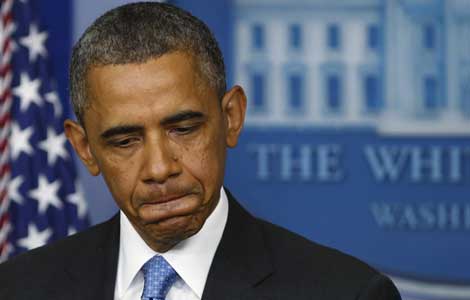
 'Trayvon Martin could have been me, 35 yrs ago': Obama
'Trayvon Martin could have been me, 35 yrs ago': Obama
 Giving take-out roast chicken a French twist
Giving take-out roast chicken a French twist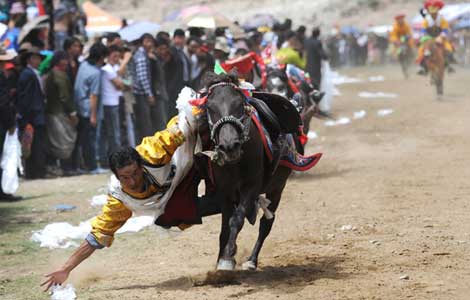
 Tibetan farmers enjoy Onkor festival
Tibetan farmers enjoy Onkor festival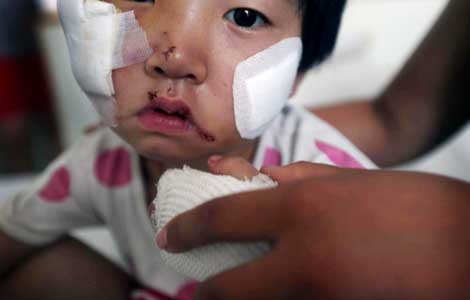
 Girl mauled by mastiff needs $32,580 for surgery
Girl mauled by mastiff needs $32,580 for surgery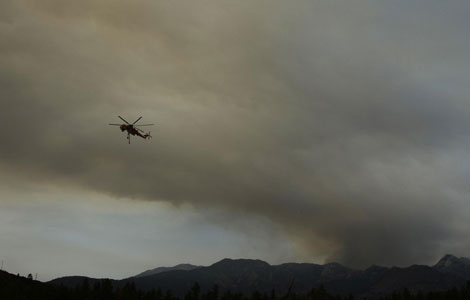
 Firefighters hold line against California wildfire
Firefighters hold line against California wildfire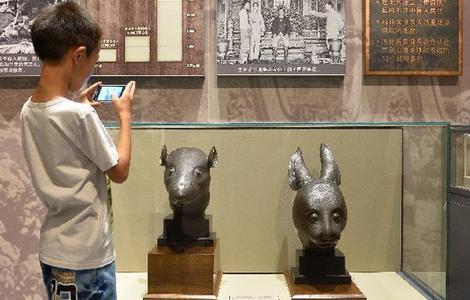
 Rat, rabbit head sculptures on display
Rat, rabbit head sculptures on display
 Detroit files biggest ever US municipal bankruptcy
Detroit files biggest ever US municipal bankruptcy
 Russia jails opposition leader
Russia jails opposition leader
Most Viewed
Editor's Picks

|

|

|

|

|

|
Today's Top News
US court says reporter must testify in leak case
Venezuela VP defends support for Snowden
'Trayvon Martin could have been me': Obama
Asiana legal fallout begins after deadly crash
Floor on lending rates axed by PBOC
Huawei backs UK security review
Blacklist on way for court defiance
Tokyo's 'big leap' aimed at China
US Weekly

|

|






